Curse of the Dead Gods
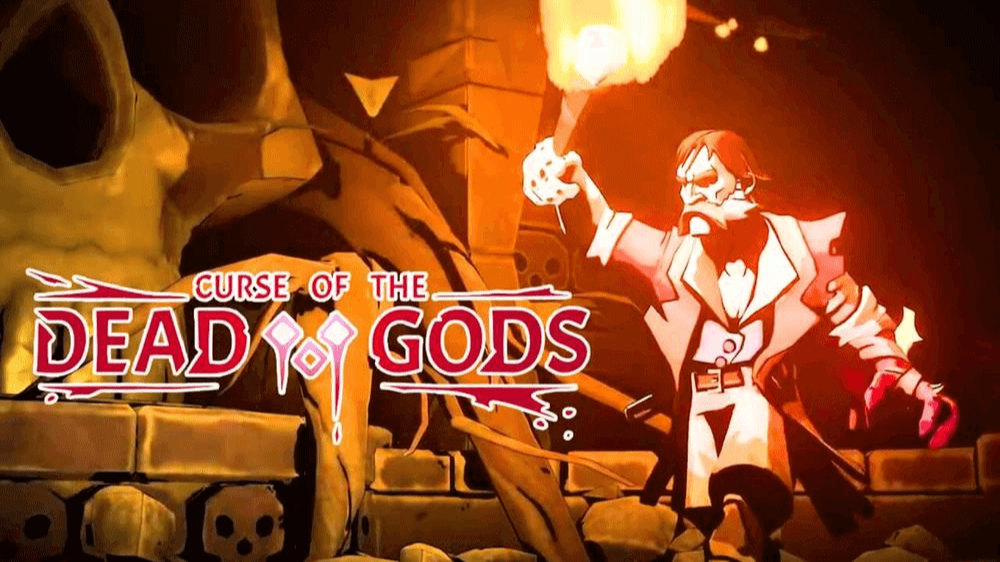
Curse of the Dead Gods - Beginners Don't Belong Here
Are you past the fifth cells in Dead Cells? Did a trip to the darkest dungeon in Darkest Dungeon turn into an unobtrusive stroll? Discovered all the fourth aspects of weapons in Hades? If you answered yes to any of those questions, Curse of the Dead Gods is a title you can sink your teeth into. If you had to Google the words "roguelite", "grind" and "meta-progression" to understand them, go ahead and take the first act of Inscryption. There you won't be punished for your mistakes and will probably be initiated into the ranks. But don't dare get introduced to the Roguelite genre through Curse of the Dead Gods! It's like learning how to ride a helicopter as a kid, not a bicycle. Curse of the Dead Gods is a place for seasoned veterans. Only they will appreciate the game at its true value...
Dark Souls from the World of Roguelike
All roguelikes have their own thing. Some counters are disposable - they tend to surprise at first, but on repeated playthroughs the player's eye gets soaked, and the once surprising counters get adjusted and become a given, a variable in the gameplay. Other gimmicks add new gameplay terms: whether it's the ever-increasing difficulty on a timer, as it was in Risk of Rain 2; or the skull swapping from Skul: The Hero Slayer, where skulls changed at the press of a button and completely transformed the gameplay experience. In Curse of the Dead Gods, the combat system was the trick.
Do not compare Curse of the Dead Gods and Hades. Even though these games look similar, they are played in a completely different way: the first one is a hardcore roguelite with soulslike combat, the second one is a narrative action game. The only thing they have in common is the isometric camera from above. Curse of the Dead Gods already at first subtly hints at the fact that you should not wait for easy mopping up locations and squishy bosses. Criminally short tutorials only tell you that the most valuable expendable is stamina, and timely parry punches through enemies' defenses.
Curse of the Dead Gods' lauded combat consists of five subtly woven together elements. Quick strikes do little damage, but a succession of quick lunges add up to a combo and then a final hard punch. Loaded strikes are performed when the hit button is pressed - the protagonist performs a special punch, each weapon has its own animation and effect. Unlike most similar games, in Curse of the Dead Gods almost all weapons are playable at all stages, so it makes sense to memorize a seemingly unremarkable item.
In addition to melee and ranged attacks, there is also a torch in the weapon slot. The torch here has far from a decorative function: the torch sets enemies on fire, ignites braziers, and illuminates dungeons. Only with a torch in your hand can you see the many traps. In the shadow and in the light the protagonist's damage received and inflicted are different, but about that later...
And last on the list, but not by purpose, are stamina management and parry. To block attacks a monstrously little time is allocated, so it is possible to successfully parry only with experience under your belt. Stamina mechanics, on the other hand, are the background and main feature of Curse of the Dead Gods. The game carefully observes the balance between risk and reward: you decide to play fast, lightning-fast reaction to all swings, you move in a precise way - you get a combo counter with kills, which multiplies the gold you get.
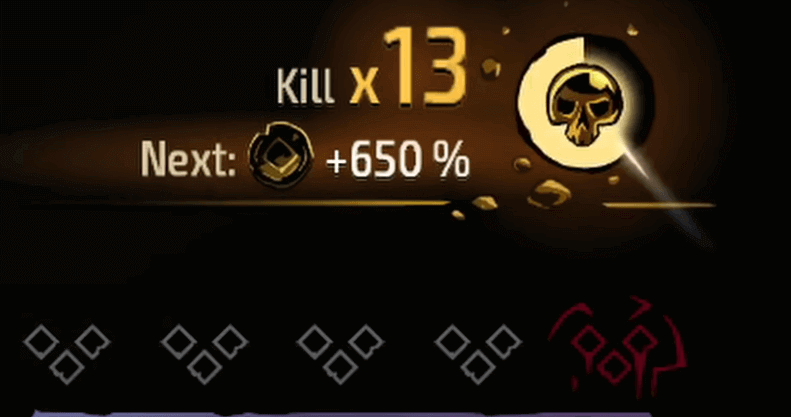
But to get to this level, you need to learn all the movements of all the mobs by heart and hone your skills. In fact, all of Curse of the Dead Gods' gameplay consists of classic room clearing, wandering through trap-laden corridors, and boss battles. It only takes an intermediate level player twenty-five hours to get a glimpse of all the content, which is unacceptably short for a roguelike. But Curse of the Dead Gods is not going to amuse, amaze, and delight the player. This game demands tactical quick thinking and the ability to position yourself correctly in battle...
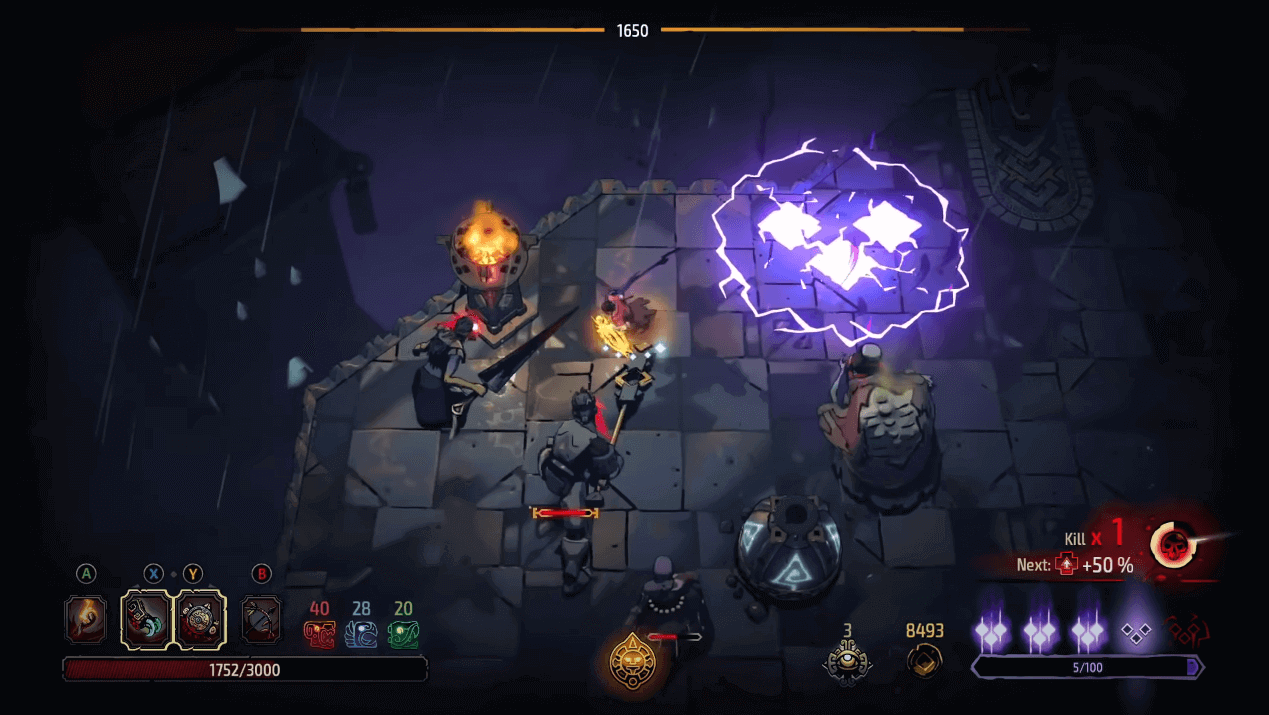
Frankenstein from Slay the Spire, Dead Cells and Hollow Knight
...as in the race itself. No random rooms or a choice of two options, one of which obviously prevails over the other. Here's the map, here's the routes - think about what's more important now and what will be more important later.
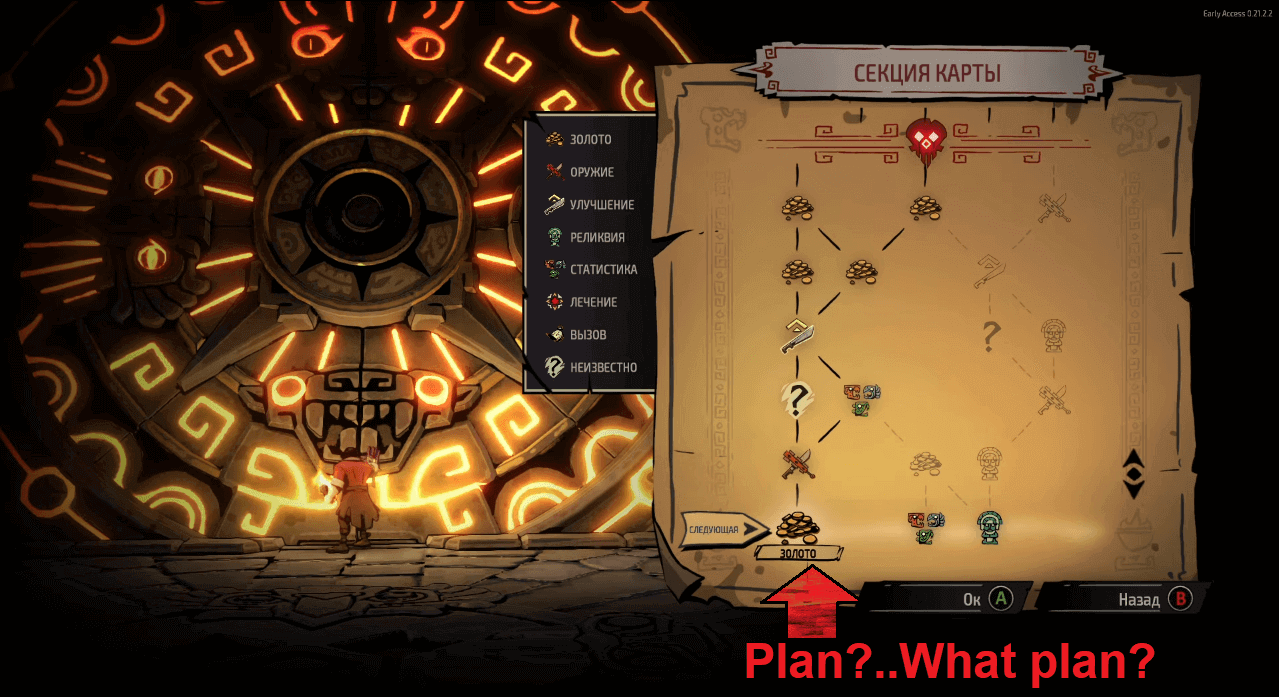
You can't change your route, though. Follow the trail with the relics - use the relics, went to get a weapon - this weapon, most likely, you will use until the end of the race.
You need to keep both your future build and the mini-map in mind and play cleverly at the same time. Curse of the Dead Gods is not the kind of game where spamming buttons does wonders: pressed parry a split second early? Take damage, be forced to heal, and regret it while battling the boss. Wasted all your stamina points on useless rolls? Again, take damage from weak enemies, so that later on, against strong mobs, to overcome, suffer and be tormented.
Curse of the Dead Gods builds resemble Dead Cells builds in only one way. The same breakdown on the three characteristics, only instead of Brutality, Stamina and Tactics put Stamina, Dexterity and Perception. Body is responsible for health points, Dexterity for damage, and Perception for gold. Just like in Dead Cells, in Curse of the Dead Gods it's silly to invest in three stats at once. Well, as in Dead Cells, no one will explain this to you, until you get the hang of it and learn to feel the game. Pump up your Stamina to the max - you won't get enough damage. Put everything into Dexterity - the character will have too little health, and the victory will be possible only if you are a cyber athlete. Focus on Perception - you won't have a lack of equipment choice, but you won't be able to unlock its potential. Unlike Dead Cells, you can't choose characteristics and you can't accentuate them.
In Curse of the Dead Gods the economy and balance are built around investments and credits. It sounds a bit complicated, but now I will outline everything in general. There are three resources in the game: gold, curses, and health. Gold sells weapons, relics, and some upgrades before the final boss battle. Curses make the game unpredictable, brings new positive and negative effects, but has a threshold after which it becomes almost impossible to pass the game. Health is a full-fledged expendable, because the protagonist has no healing elixirs or mutations. Health can be restored only with the help of special properties of items in special rooms and with the help of amulet.
No matter how you play the game, you'll still be short on gold, health, or annoying curses. The game allows you to sacrifice, say, gold but not get curses, or catch more curses but save gold. You can heal at the expense of curses and remove curses at the expense of pure play. There are plenty of such stone/scissors/paper combinations in Curse of the Dead Gods. Making a plan for the game in languid minutes, showing wit and foresight, and then seeing the fruits of your foresight - that's the charm of Curse of the Dead Gods...
The situation with weapons is also interesting. In addition to dry characteristics with damage, weapons have affixes. Affixes are not just limited to linear efficiency improvements, but also contain unobvious synergies. For example: you can find a weapon that improves the properties of a weapon in an adjacent slot by 50%. If there is something with poison in the adjacent slot, and your inventory is full of relics that enhance poison damage, your chances of getting through the game increase dramatically.
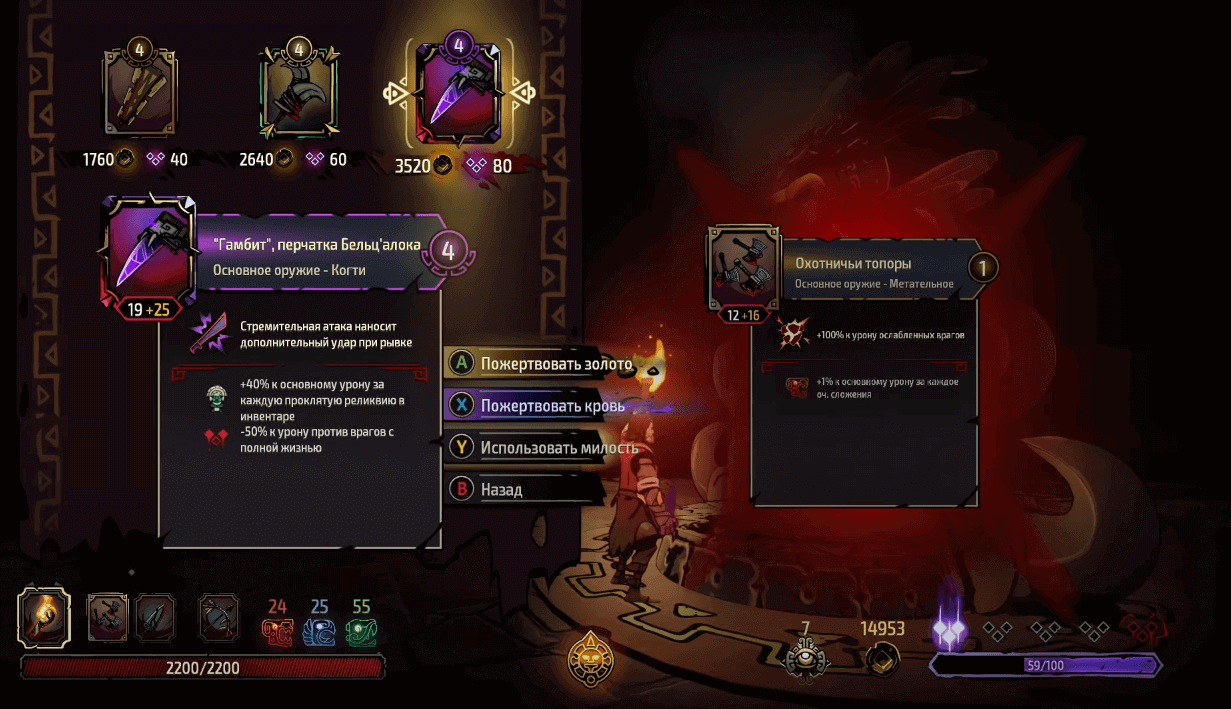
And that's only half of all the nuances you have to keep in mind. No wonder you feel lost during the first races. Do you think it's going to get easier from here on out? Not a word was said about local meta-progression. Maybe you can use it to gain critical mass, to make the game easier and more comfortable? Not really. Curse of the Dead Gods meta-progression is about unlocking items and amulets. There is no background progression of the protagonist, only the player's own skill progression.
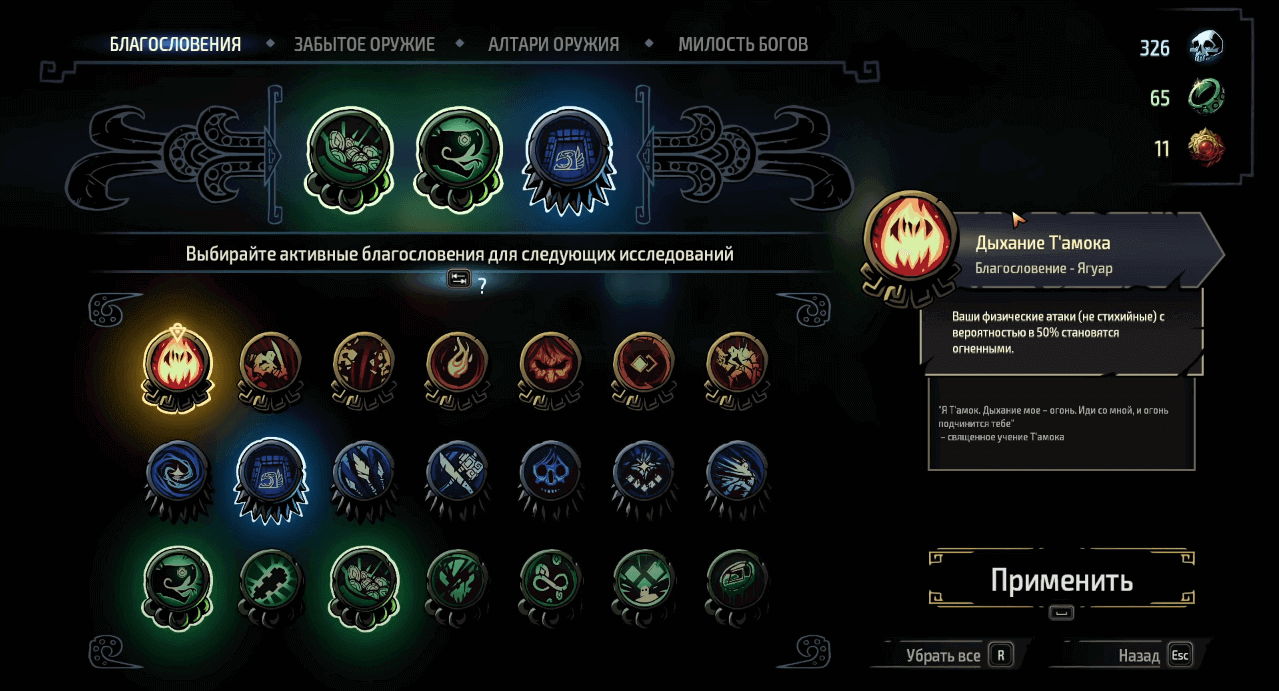
Amulets do not break the balance. They are either strong, but subject to conditions, or useless. With items the situation is about the same, but in all the variety of weapons you need to understand, build synergies in your head and sift out the grains from the chaff. You don't dump all this information on your head at once; everything is learned empirically, by trial and error. The funny thing is that all of the above are just fragments of other games, and we haven't gotten to the author's handwriting yet...
Author's Notes and Ode to Synergy in Rogue-lite
Remember when we mentioned that damage in light and in shadow is different in the game? Curse of the Dead Gods has only two original, non-borrowed mechanics: light and shadows and curses. And yes, both make the game even more challenging. Characters tend to do less damage in the light, more damage in the shadows. Since Curse of the Dead Gods is a game about a tomb raider, the ancient traps look good. You can't see the ambush in the dark, so ignoring the torch is fraught with the risk of taking damage at nothing.
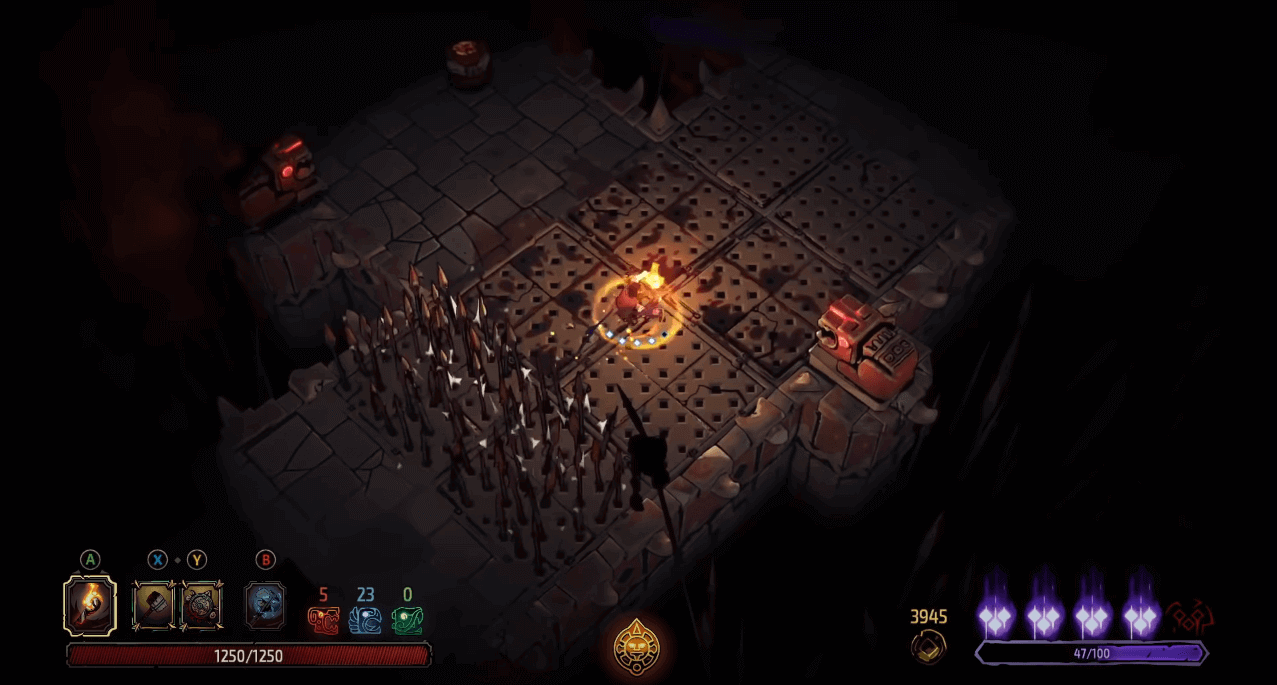
Traps, however, are the least evil. First, they are often found in deserted corridors and are needed only to keep the player from relaxing. And second, traps can be used to your advantage by activating them near the local mobs. This pirouette makes the game a little easier, and some amulets increase the damage of the traps. Why did the developers add such an item? So that the player would choose to take more damage instead of a useful bonus? No, the developers at Passtech Games wanted their players to try to play through traps specifically.
But the crowning glory of Curse of the Dead Gods is not the lighting, but the mechanics of the curses. This is where the game fully justifies the "hardcore" tag. Whenever the protagonist goes from room to room, takes damage from enchanted creatures, or sacrifices blood on altars for items, the spoilage scale rises. Once the spell reaches 100, a new rule is added to the game. There can be up to five curses, and the fifth and final one is the worst. The first four curses are random, and the fifth is always alone - the health scale of the protagonist is gradually reduced to one. The curses are activated in transitions between rooms and are accompanied by a small cutscene:
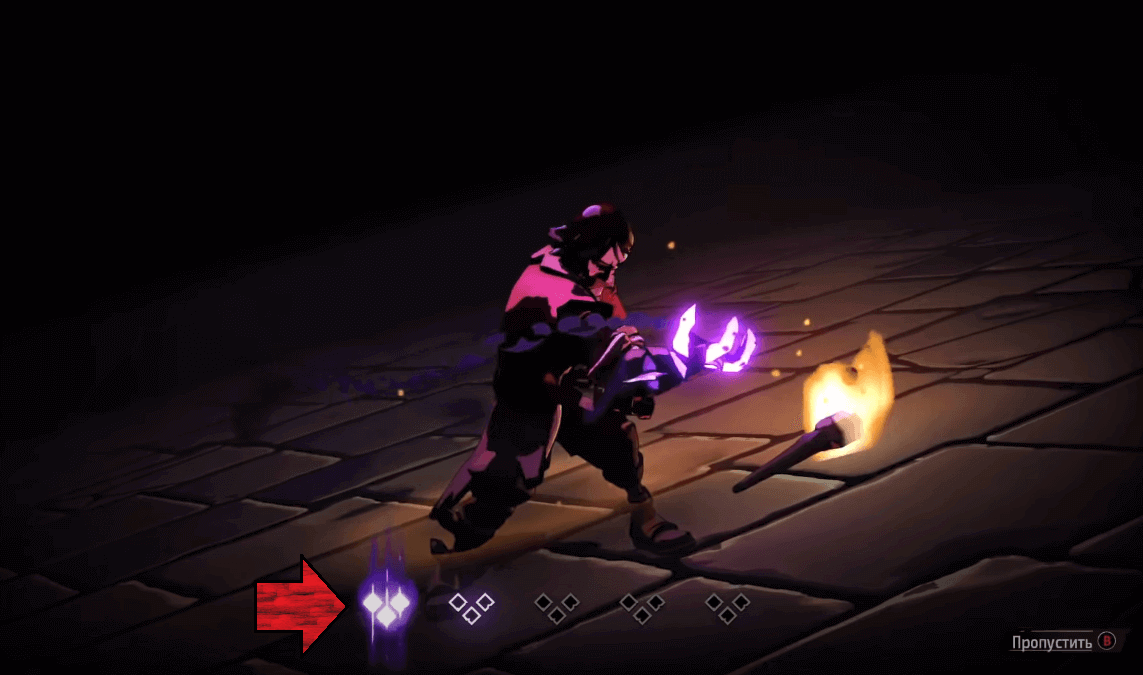
Curses are not always negative, but they always change the rules of the game. There are many curses, they are imposed randomly and bring the right amount of chaos to the game. Already at the beginning you can get such a curse, which forces to adjust to the new rules. For example: there is a curse that allows you to lose less health at the expense of losing gold. Then it is more profitable to pump up the same Perception and withstand more damage to the detriment of the gold. But it's not always possible to adjust for curses. There is a notorious curse that makes the properties of other curses unknown. In that case, you'll either have to glean what curse just appeared, or your run will be ruined. Of course, like everything in this game, all curses must be learned.
Is Curse of the Dead Gods worth buying?
Only if you're fed up with the rest of Roguelike, know the genre like the back of your hand, and aren't afraid of the difficulty. The price tag on Curse of the Dead Gods is democratic - up to $10. And $10 is not an amount you should regret spending if you're looking for something new.
But if Rogue-lite is a dead-end street for you, you should buy Curse of the Dead Gods only at at least 30% off. There's a high probability that you won't succeed in this game, consider it unfair and leave it to gather dust on your virtual shelf.
